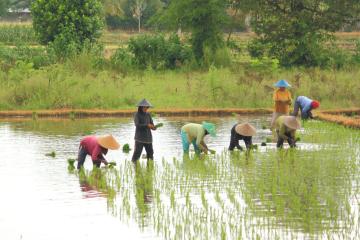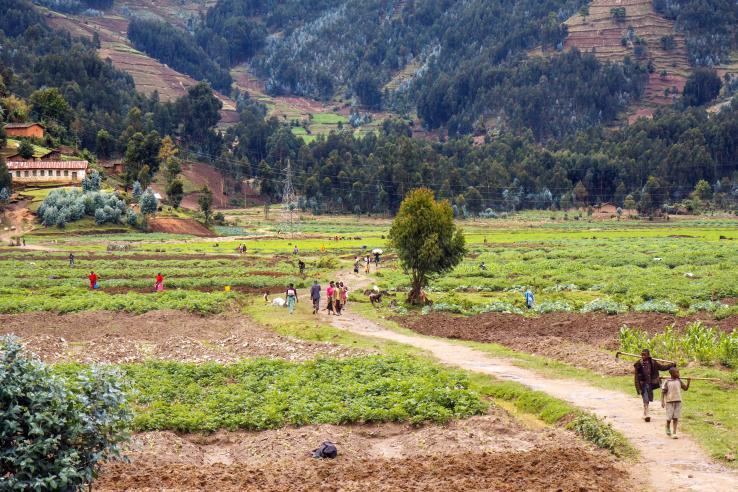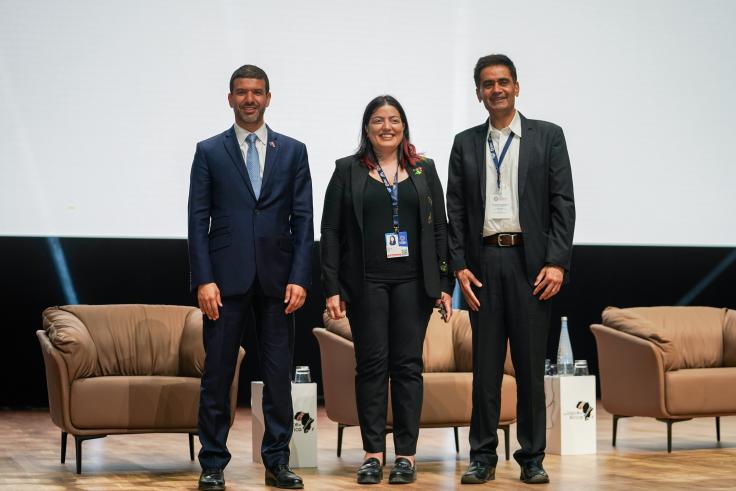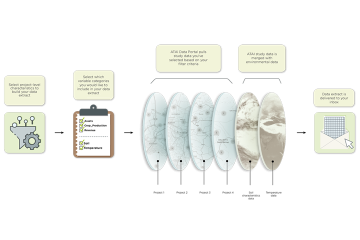
J-PAL and UM6P launch new agriculture research lab to improve food security and support evidence-informed decision-making in sub-Saharan Africa

On October 10, J-PAL in partnership with University Mohammed VI Polytechnic launched the UM6P-J-PAL Agricultural Lab for Africa. Chaired by Tavneet Suri (MIT, J-PAL Agriculture sector Co-Chair), the lab will be hosted at University Mohammed VI Polytechnic (UM6P) in Rabat, Morocco, with the goal of designing and funding rigorous impact evaluations of private sector programs that improve small-scale farmers’ food security, productivity, and profitability in sub-Saharan Africa.
The lab was announced during this year’s Spring Annual Meetings of the World Bank Group and International Monetary Fund in Marrakech, Morocco, as part of UM6P’s “the Voice of Africa” side event panel discussions on food security and sustainability. Participants heard from Tavneet Suri on her vision for the lab as academic chair, Iqbal Dhaliwal (MIT; J-PAL Executive Director) on expanding J-PAL’s portfolio of work in agriculture with the private sector, and Hicham El Habti (UM6P President) on the importance of partnership to achieve broad development of the agriculture sector in sub-Saharan Africa.

Tackling food insecurity through agricultural value chains
Small-scale farmers face numerous decision points throughout the production cycle, such as how much fertilizer to apply, what mixture of fertilizer is best for their soil and crop, where to sell their output for the highest possible price, among many others.
In recent years, the factors that affect small-scale agriculture in sub-Saharan Africa have become more complicated. Specifically, the world has experienced a rise in global food insecurity, resulting from changes in international market structures and regulation, trade disruptions under Covid-19 protocols and geo-political conflict, climate change, and other political and economic dynamics. Understanding how to improve food systems is, therefore, an essential step along the path to reducing poverty and securing livelihoods for rural communities across sub-Saharan Africa.
In response to this growing uncertainty, clear policies and programs that support farmers to invest in higher-yielding, more profitable, tailored, and innovative technologies are essential. However, there are still a number of policy questions yet to be answered to inform large-scale improvements in agricultural systems. As many agricultural supply chains and systems work across countries, markets, and stakeholders, it is imperative to build this evidence base to inform decision-making with NGOs and governments as well as the private sector, which has an outsized opportunity to affect change in agricultural markets and value chains.
Conducting research on scalable programs with the private sector
With an initial grant from OCP Foundation, UJALA will fund innovative research over the course of three years and six RFPs that rigorously evaluate these critical questions and challenges. UJALA will generate research and actionable policy lessons in five key areas:
- Designing and delivering effective food and agricultural subsidies
- Assessing the value of fertilizer customization to crop needs and soil nutrients
- Reducing low-income households’ reliance on imported food
- Alleviating farmers’ constraints to adopting and maintaining new agricultural technologies and practices
- Connecting farmers to markets that sell at competitive prices.
As a lab, UJALA will work in close collaboration with private sector partners in sub-Saharan Africa to conduct randomized evaluations of their services for small-scale farmers. The partners UJALA works with will be selected based on scale of operations, relevance to the research agenda, and interest in learning about their business models and impacts from rigorous, quantitative research. UJALA will have the express goal to disseminate research results to relevant public and private sector actors and support the scale up of effective programs and services with partners.
To achieve these goals, UJALA will work along the research life-cycle from conceptualizing evaluations to disseminating results and facilitating discussions on how to scale effective programs and services. Specifically, UJALA aims to:
- Identify programs delivered by our private sector partners with the potential to answer open questions related to agricultural technology adoption in Africa
- Connect partners with researchers in the J-PAL network to facilitate multi-stakeholder research partnerships
- Fund randomized evaluations to build an evidence base on increasing small-scale farmers’ productivity and profitability through the uptake of improved and accessible agricultural technologies
- Summarize and synthesize available results to address and answer outstanding questions relevant to policy and practice
- Disseminate the evidence to inform relevant agricultural development strategies across the African continent.
Looking ahead
Through strong partnerships with the private sector and researchers in the J-PAL network, UJALA will support the generation of new evidence and evidence-based decision-making among private sector partners. As a result of their operational scale and incentives to quickly respond to market changes, the private sector is uniquely positioned to tackle the looming challenges of climate change, market instability, and food insecurity and to improve the lives of thousands of small-scale farmers across sub-Saharan Africa.
If you are a researcher interested in learning more and getting involved, please reach out to [email protected].

